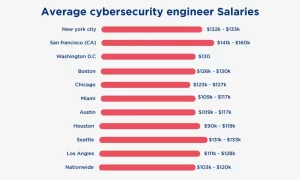Introduction
Welcome, future Cybersecurity Engineers! If you’ve ever been fascinated by the world of digital mysteries, where hackers roam and heroes rise to protect the virtual kingdom, you’re in the right place. In this beginner’s guide, we’ll take you on a journey to unravel the secrets of becoming a Cybersecurity Engineer. Don’t worry if you’re a complete newbie – we’ll break down complex concepts into bite-sized pieces, making your adventure into cybersecurity accessible and exciting. At Analytics Jobs, you will gather all the essential information needed to choose the best course, institute and more.
Understanding the Basics
Imagine the digital world as a vast universe filled with valuable information and hidden threats. Your mission as a Cybersecurity Engineer is to be the guardian of this universe, protecting it from cyber villains. To start your journey, let’s explore the key components of the cybersecurity universe:
What is Cybersecurity?
Picture this: You’re a digital detective investigating a crime scene, but instead of fingerprints, you’re analyzing lines of code. Cybersecurity involves safeguarding computers, networks, and systems from unauthorized access, attacks, and damage. You’ll be the hero who prevents data breaches, cyber-attacks, and other digital disasters.
In simple terms, Cybersecurity is the practice of protecting computer systems, networks, and digital information from theft, damage, or unauthorized access. It involves implementing measures to ensure the confidentiality, integrity, and availability of data in the digital domain.
|
Scenarios and Examples: Password Protection:
Phishing Attacks:
Malware Infection:
Unauthorized Network Access:
Insider Threats:
|
Job Profiles in Cybersecurity
There are various job profiles within the field of cybersecurity, each with its own set of responsibilities and requirements. Here are some common job roles in cybersecurity:
|
What is the Work of a Cybersecurity Engineer?
A cybersecurity engineer is responsible for designing, implementing, and maintaining security measures to protect an organization’s computer systems and networks. To be effective in this role, a cybersecurity engineer should possess a combination of technical, analytical, and communication skills. Here are the key skills needed for a cybersecurity engineer:
Network Security:
- Understand network protocols and architectures.
- Implement and configure firewalls, intrusion detection/prevention systems, and VPNs.
Security Frameworks:
- Familiarity with cybersecurity frameworks such as NIST, ISO 27001, and CIS Critical Security Controls.
Risk Management:
- Identify and assess security risks.
- Develop and implement risk mitigation strategies.
Security Assessment and Testing:
- Conduct security assessments, penetration testing, and vulnerability assessments.
Incident Response:
- Develop and implement incident response plans.
- Investigate and respond to security incidents.
Security Architecture:
- Design and implement secure systems and networks.
- Understand security design principles.
Cryptography:
- Knowledge of cryptographic algorithms and their applications.
- Implement encryption and decryption mechanisms.
Identity and Access Management (IAM):
- Implement and manage access controls.
- Ensure proper user authentication and authorization.
Security Compliance:
- Ensure compliance with relevant regulations and standards.
- Conduct security audits and assessments.
Security Software Tools:
- Familiarity with security tools such as antivirus, intrusion detection/prevention systems, SIEM (Security Information and Event Management), and others.
Programming and Scripting:
- Basic understanding of programming languages and scripting for tasks like automation and analysis.
Security Awareness and Training:
- Develop and deliver security training programs for employees.
- Raise awareness about security best practices.
Communication Skills:
- Effectively communicate technical information to both technical and non-technical stakeholders.
- Collaborate with other IT and business units.
Problem-Solving Skills:
- Analyze complex security issues and develop effective solutions.
- Troubleshoot security incidents and implement corrective actions.
Ethical Hacking Skills:
- Understand ethical hacking techniques for penetration testing.
- Identify and remediate vulnerabilities in systems and networks.
A Journey through the History of Cybersecurity
The history of cybersecurity has been a complex and evolving field, with key milestones including the birth of hacking in the 1960s, the rise of computer viruses in the 1970s, the rise of malware and cyberattacks in the 1980s, the rise of the internet boom in the 1990s, the proliferation of cyber threats in the 2000s, the creation of Microsoft’s Trustworthy Computing Initiative in 2002, the discovery of Stuxnet in 2007, the rise of Advanced Persistent Threats (APTs) in the 2010s, the leaks of Edward Snowden’s classified documents in 2013, and the NotPetya and Equifax breaches in 2017.
These events have highlighted the need for improved cybersecurity measures and the importance of cybersecurity awareness, training, and collaboration. As cybersecurity continues to evolve, it is crucial for organizations to invest in cybersecurity measures to protect individuals, organizations, and nations from the ever-changing landscape of cyber risks.
Requirements of a Cybersecurity Engineer
Becoming a cybersecurity engineer involves a combination of education, skills development, and practical experience. Here are the key requirements to become a cybersecurity engineer:
Educational Background:
- A bachelor’s degree in Computer Science, Information Technology, Cybersecurity, or a related field is often preferred.
- Some roles may require advanced degrees or additional certifications.
Cybersecurity Certifications:
Obtain relevant certifications to demonstrate expertise. Common certifications include:
- Certified Information Systems Security Professional (CISSP)
- Certified Ethical Hacker (CEH)
- CompTIA Security+
- Certified Information Security Manager (CISM)
- Offensive Security Certified Professional (OSCP)
Network and System Administration Skills:
- Understand network protocols, architectures, and security configurations.
- Proficiency in system administration, including configuring and securing operating systems.
Programming and Scripting:
- Develop programming and scripting skills, especially in languages like Python, PowerShell, or Bash.
- Scripting skills are valuable for automating security tasks and analyzing data.
Security Frameworks and Standards:
- Familiarity with cybersecurity frameworks and standards such as NIST, ISO 27001, and CIS Critical Security Controls.
- Understanding of regulatory requirements applicable to the industry.
Incident Response and Forensics:
- Knowledge of incident response procedures and forensic analysis.
- Ability to investigate and analyze security incidents.
Vulnerability Management:
- Experience with vulnerability assessments and penetration testing.
- Knowledge of tools like Nessus, Qualys, and Metasploit.
Security Information and Event Management (SIEM) Systems:
- Understanding of SIEM tools for log analysis and threat detection.
- Familiarity with tools like Splunk, ELK Stack, or IBM QRadar.
Firewall and Network Security:
- Configure and manage firewalls to control and monitor network traffic.
- Implement network security protocols and measures.
Endpoint Security:
- Implement and manage security solutions on individual devices (endpoints).
- Knowledge of antivirus, anti-malware, and endpoint detection and response (EDR) solutions.
Encryption and Cryptography:
- Understanding of encryption algorithms and cryptographic protocols.
- Implementation of encryption mechanisms to protect sensitive data.
Identity and Access Management (IAM):
- Manage user identities and access controls.
- Implement multi-factor authentication and least privilege principles.
Security Awareness and Training:
- Develop and deliver security training programs for employees.
- Promote a security-aware culture within the organization.
Cloud Security:
- Knowledge of security considerations in cloud environments.
- Familiarity with cloud security tools and best practices for AWS, Azure, or Google Cloud.
Soft Skills:
- Strong analytical and problem-solving skills.
- Effective communication skills to convey complex security issues to both technical and non-technical stakeholders.
Experience:
- Gain practical experience through internships, entry-level positions, or relevant projects.
- Participate in cybersecurity communities, conferences, and capture the flag (CTF) events to enhance skills.

How to Become a Cybersecurity Engineer? : A Step-by-Step Guide
- Get a Basic Education: Start by finishing high school. Then, consider getting a degree in Computer Science, Information Technology, or Cybersecurity.
- Learn Computer Basics: Understand how computers work, and get comfortable with using them.
- Learn Basic Coding: Pick up some basic coding skills. Start with user-friendly languages like Python.
- Know the Internet and Networks: Learn how the internet functions and understand basic network concepts.
- Explore Online Courses: Take free or affordable online courses to understand the fundamentals of cybersecurity.
- Understand Security Concepts: Learn about the basics of keeping information safe, like passwords and secure connections.
- Get a Security Certification: Consider getting entry-level certifications like CompTIA Security+ to show your knowledge.
- Set Up a Home Lab: Practice what you’ve learned by setting up a home lab to experiment with different security tools.
- Dive into Cybersecurity Communities: Join online forums and groups where cybersecurity enthusiasts share knowledge.
- Specialize in Areas of Interest: Discover what parts of cybersecurity interest you the most, like network security or ethical hacking.
- Stay Informed: Regularly read blogs, watch videos, and follow cybersecurity news to stay updated.
- Practice Ethical Hacking: Learn ethical hacking by practicing on platforms that allow you to test your skills legally.
- Attend Local Meetups: Attend local meetups or events to connect with other aspiring cybersecurity professionals.
- Apply for Internships: Look for internships or entry-level positions to gain practical experience.
- Get Familiar with Cloud Security: Learn about securing data and systems in cloud platforms like AWS, Azure, or Google Cloud.
- Improve Soft Skills: Work on your communication and teamwork skills, as you’ll need them in a cybersecurity career.
- Get Advanced Certifications (Optional): As you gain experience, you might consider advanced certifications like Certified Information Systems Security Professional (CISSP).
Cybersecurity Engineers Job Outlook
The demand for cybersecurity professionals is on the rise due to the increasing frequency and sophistication of cyber threats. Factors contributing to this demand include the rise in cyber threats, digital transformation, regulatory compliance, evolving technology landscape, remote work challenges, skill shortage, industry diversity, competitive salaries, career advancement opportunities, and continuous learning and certification.
Cybersecurity professionals are needed to secure the Internet of Things (IoT), artificial intelligence (AI), and 5G networks, while the shift to remote work has increased the importance of securing access and communication. The global shortage of skilled cybersecurity professionals is a challenge, but the industry diversity allows professionals to choose roles aligned with their interests.
Competitive salaries and benefits are also available due to the high demand for cybersecurity expertise. Career advancement opportunities in cybersecurity include areas like penetration testing, threat intelligence, and security architecture.
Get Advice
Get Free Career
Counselling from
Experts
Book a Session with an Industry Professional today!
By continuing you agree to our Terms of Service and Privacy Policy, and you consent to receive offers and opportunities from the Analytics Jobs platform listed EdTech’s by telephone, text message, and email.
Salary of a Data Scientist
- Cybersecurity Engineer’s Salary Abroad

- Cybersecurity Engineer’s Salary India
According to Glassdoor, in India, the average yearly income for a Cybersecurity Engineer is ₹7,00,000. The average additional cash compensation for a Cyber Security Engineer falls between ₹45,893 and ₹1,79,601.
According to AmbitionBox, with a range of ₹45,893 to ₹1,79,601, the average yearly compensation for a Cyber Security Engineer in India is ₹7,00,000. The average additional cash compensation for a Cyber Security Engineer in India is ₹1,00,000.
Conclusion
Congratulations, Cybersecurity Engineer! You’ve completed the beginner’s guide and are now ready to embark on your cybersecurity adventure. Remember, the journey is ongoing, and every challenge you face will only make you stronger. Stay curious, be vigilant, and enjoy the thrill of being a guardian in the ever-expanding digital universe. May your code be secure, and your defenses impenetrable!
Books and Online Resources
Books:
- “Hacking: The Art of Exploitation” by Jon Erickson:
- “Web Application Hacker’s Handbook” by Dafydd Stuttard and Marcus Pinto:
- “Network Security Essentials” by William Stallings:
- “Security Engineering: A Guide to Building Dependable Distributed Systems” by Ross J. Anderson:
- “Metasploit: The Penetration Tester’s Guide” by David Kennedy, Jim O’Gorman, et al.:
- “CISSP All-in-One Exam Guide” by Shon Harris and Fernando Maymi:
- “The Web Application Hacker’s Handbook 2” by Dafydd Stuttard and Marcus Pinto:
- “Blue Team Handbook: Incident Response Edition” by Don Murdoch GSE:
Online Resources:
- Cybrary:
- Cybrary offers a wide range of cybersecurity courses, including hands-on labs and certification preparation.
- Coursera:
- Platforms like Coursera host cybersecurity courses from universities and organizations worldwide.
- edX:
- Similar to Coursera, edX provides cybersecurity courses from renowned institutions.
- SANS Internet Storm Center:
- The SANS Internet Storm Center offers daily diaries and resources on cybersecurity and threat intelligence.
- OWASP (Open Web Application Security Project):
- OWASP provides resources, tools, and documentation focused on web application security.
- Hack The Box:
- Hack The Box is a platform for hands-on cybersecurity challenges and learning.
- GitHub – Awesome Security:
- The Awesome Security GitHub repository curates a list of resources, tools, and learning materials for cybersecurity.
- The Cyber Mentor YouTube Channel:
- The Cyber Mentor offers video tutorials on ethical hacking and cybersecurity concepts.
Frequent Asked Questions (FAQs)
Cybersecurity is the practice of protecting computer systems, networks, and data from security threats. It’s crucial in the digital age to safeguard sensitive information and maintain the integrity of systems.
Cybersecurity engineers design, implement, and manage security measures to protect digital assets. Their responsibilities include securing networks, responding to incidents, and ensuring the confidentiality and integrity of data.
Essential skills include knowledge of networking, programming/scripting, understanding security frameworks, and expertise in tools like firewalls, intrusion detection systems, and more.
Begin by learning foundational IT skills, gaining basic coding knowledge, and pursuing entry-level certifications. Building a home lab for hands-on practice and participating in cybersecurity communities are also beneficial.
While a degree in Computer Science, Information Technology, or Cybersecurity is beneficial, practical experience, certifications, and continuous learning are equally important for success in cybersecurity.
Certifications, such as CompTIA Security+, CISSP, and CEH, can significantly enhance your credibility and marketability in the cybersecurity field. They validate your expertise and knowledge.
Stay informed by regularly reading blogs, following cybersecurity news outlets, participating in forums, attending conferences, and engaging with online communities.
Yes, numerous online platforms offer cybersecurity courses. Cybrary, Coursera, edX, and platforms like Hack The Box are excellent resources for learning and hands-on practice.
Ethical hacking involves authorized attempts to exploit computer systems for the purpose of identifying security vulnerabilities. It’s an essential aspect of cybersecurity, helping organizations identify and fix potential weaknesses.
Cybersecurity professionals often face challenges like the ever-evolving threat landscape, skill shortages, and the need for continuous learning. Effective communication with non-technical stakeholders can also be a challenge.
Recent Posts
- IIT DELHI LAUNCHES CERTIFICATE PROGRAM TO HELP STUDENTS IN ENGINEERING. 26-07-2024
- MedLearn OPENS A NEW CAMPUS IN BENGALURU TO HELP HEALTHCARE PROFESSIONALS. 26-07-2024
- BYJU’S INSOLVENCY: BYJU RAVEENDRAN FILES NEW APPEAL AGAINST NCLT ORDER IN KARNATAKA HIGH COURT. 26-07-2024
- ApplyBoard AND TD ANNOUNCE A NEW COLLABORATION TO EMPOWER INDIAN STUDENTS. 24-07-2024
- StudyMEDIC AND OC Academy PROVIDE CLINICAL FELLOWSHIP PROGRAMS FOR MEDICAL CANDIDATES. 23-07-2024

